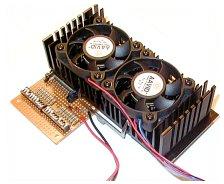Bij The Tech Report hebben ze een review gepost van Trinty Micro's Gold Finger overclocking device, waarmee je de multiplier van je Athlon kan aanpassen. De reviewer kreeg hierdoor zijn Athlon 500 heel makkelijk draaien op 721MHz (7 x 103). In 3DMark 2000 levert dit zo'n 20% winst op in de CPU Marks. Hieronder een stukkie copy/paste uit de test:
And how did my overclocking experiment turn out? My week 43 Athlon ended up running at 721MHz (7X multiplier, 103MHz bus speed), rock-solid stable at the default 1.6 voltage. 750 and 800 flaked out rather severely by comparison. Because the Golden Fingers card doesn't allow for manipulation of cache divider, it's possible that the L2 cache is holding mine back. Hopefully, rumors of a BIOS-adjustable cache divider will turn into a BIOS upgrade that will let me push on this chip a little harder. Even if it doesn't, however, I paid around $275 for a 700MHz chip, and you can't argue with that.The 103 MHz bus speed was simply an attempt to eke a little more out of the processor. Manipulating the multiplier and manipulating the bus complement each other well because the multiplier lets you take as many big steps up as possible, while the bus change lets you bump the speed up in smaller increments.
Of course, had I purchased an Athlon with the "full mod," where the processor's PCB is modified to allow DIP switches to control all settings, I would be able to alter the cache divider today; like everything, it's a trade-off. Personally, I still like the idea of the Golden Fingers card better than modifying the processor itself. Rumor has it that all Athlons manufactured from December 1999 forward are based on the .18 micron process. Rumor also has it that they'll often hit 1000MHz. Assuming the BIOS cache divider pans out, I'll be able to purchase one of these news Athlons and use the same Golden Fingers card to overclock the new chip. With the full mod, you'll shell out cash every time you purchase a new chip.
 |
